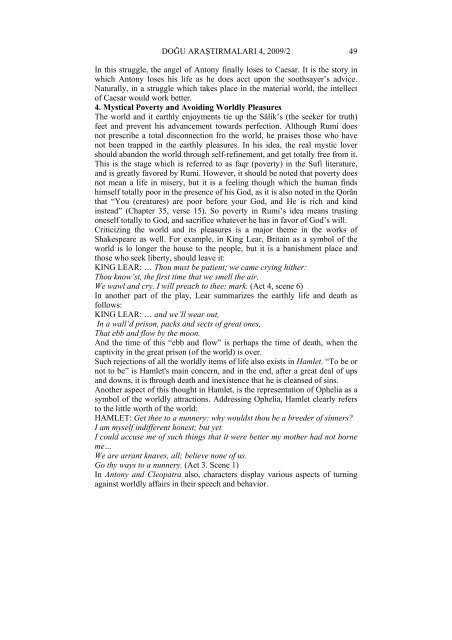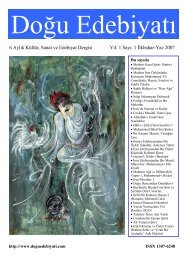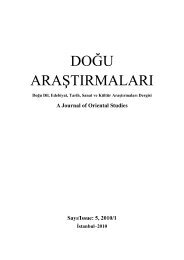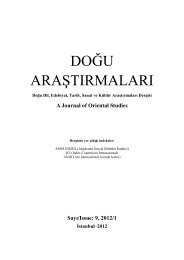A Journal of Oriental Studies Sayı/Issue - Doğu Edebiyatı
A Journal of Oriental Studies Sayı/Issue - Doğu Edebiyatı
A Journal of Oriental Studies Sayı/Issue - Doğu Edebiyatı
You also want an ePaper? Increase the reach of your titles
YUMPU automatically turns print PDFs into web optimized ePapers that Google loves.
DOĞU ARAŞTIRMALARI 4, 2009/2 49<br />
In this struggle, the angel <strong>of</strong> Antony finally loses to Caesar. It is the story in<br />
which Antony loses his life as he does acct upon the soothsayer’s advice.<br />
Naturally, in a struggle which takes place in the material world, the intellect<br />
<strong>of</strong> Caesar would work better.<br />
4. Mystical Poverty and Avoiding Worldly Pleasures<br />
The world and it earthly enjoyments tie up the Sâlik’s (the seeker for truth)<br />
feet and prevent his advancement towards perfection. Although Rumi does<br />
not prescribe a total disconnection fro the world, he praises those who have<br />
not been trapped in the earthly pleasures. In his idea, the real mystic lover<br />
should abandon the world through self-refinement, and get totally free from it.<br />
This is the stage which is referred to as faqr (poverty) in the Sufi literature,<br />
and is greatly favored by Rumi. However, it should be noted that poverty does<br />
not mean a life in misery, but it is a feeling though which the human finds<br />
himself totally poor in the presence <strong>of</strong> his God, as it is also noted in the Qorân<br />
that “You (creatures) are poor before your God, and He is rich and kind<br />
instead” (Chapter 35, verse 15). So poverty in Rumi’s idea means trusting<br />
oneself totally to God, and sacrifice whatever he has in favor <strong>of</strong> God’s will.<br />
Criticizing the world and its pleasures is a major theme in the works <strong>of</strong><br />
Shakespeare as well. For example, in King Lear, Britain as a symbol <strong>of</strong> the<br />
world is lo longer the house to the people, but it is a banishment place and<br />
those who seek liberty, should leave it:<br />
KING LEAR: … Thou must be patient; we came crying hither:<br />
Thou know’st, the first time that we smell the air,<br />
We wawl and cry. I will preach to thee: mark. (Act 4, scene 6)<br />
In another part <strong>of</strong> the play, Lear summarizes the earthly life and death as<br />
follows:<br />
KING LEAR: … and we’ll wear out,<br />
In a wall’d prison, packs and sects <strong>of</strong> great ones,<br />
That ebb and flow by the moon.<br />
And the time <strong>of</strong> this “ebb and flow” is perhaps the time <strong>of</strong> death, when the<br />
captivity in the great prison (<strong>of</strong> the world) is over.<br />
Such rejections <strong>of</strong> all the worldly items <strong>of</strong> life also exists in Hamlet. “To be or<br />
not to be” is Hamlet's main concern, and in the end, after a great deal <strong>of</strong> ups<br />
and downs, it is through death and inexistence that he is cleansed <strong>of</strong> sins.<br />
Another aspect <strong>of</strong> this thought in Hamlet, is the representation <strong>of</strong> Ophelia as a<br />
symbol <strong>of</strong> the worldly attractions. Addressing Ophelia, Hamlet clearly refers<br />
to the little worth <strong>of</strong> the world:<br />
HAMLET: Get thee to a nunnery: why wouldst thou be a breeder <strong>of</strong> sinners?<br />
I am myself indifferent honest; but yet<br />
I could accuse me <strong>of</strong> such things that it were better my mother had not borne<br />
me…<br />
We are arrant knaves, all; believe none <strong>of</strong> us.<br />
Go thy ways to a nunnery. (Act 3. Scene 1)<br />
In Antony and Cleopatra also, characters display various aspects <strong>of</strong> turning<br />
against worldly affairs in their speech and behavior.





